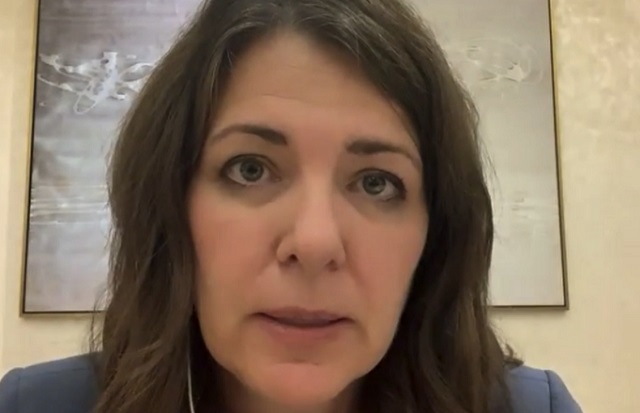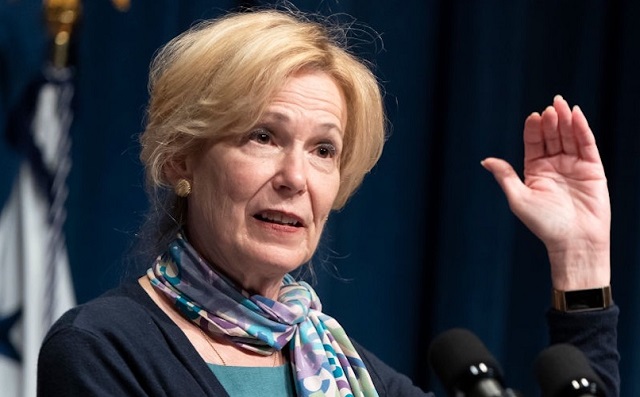Alberta
Danielle Smith: Just ‘watch me’ protect Alberta from federal restrictions on oil, gas production

From LifeSiteNews
‘That is what the Sovereignty Act was about, sending the indication that we’re simply not going to comply with federal rules around this’
Alberta Premier Danielle Smith warned the federal government of Prime Minister Justin Trudeau to “watch me” over how she will shield her province from economic damage and high fuel prices after the feds announced a plan to cut oil and gas production by a third via an “emissions” reduction scheme by 2030.
“You’ll just have to watch me if you don’t believe me. That is what the Sovereignty Act was about, sending the indication that we’re simply not going to comply with federal rules around this,” Smith said while speaking to reporters at the United Nations’ COP28 climate confab on Thursday.
Smith warned that the Trudeau government is risking a full-blown “constitutional crisis” over what she said are “economic sanctions” on Alberta because of Trudeau’s oil and gas production cut.
On Thursday, Environment Minister Steven Guilbeault unveiled a plan at COP28 to slash oil and gas emissions by 35% to 38% below 2019 levels. He claimed that Canada needs to reach “carbon neutrality in Canada by 2050.”
Natural Resources Minister Jonathan Wilkinson claimed that the federal government’s new rules are needed to keep the planet from “burning up.”
Smith agreed to attend COP28 to paint her province in a positive light and to promote its oil and gas industry in direct opposition to the Trudeau feds. She said Alberta and Canada are under attack by the Trudeau government and his “eco-extremist,” admitted socialist environment minister.
Smith issued a joint statement with Alberta Minister of Environment and Protected Areas Minister Rebecca Schulz on Thursday that said the Trudeau government’s new rules amount to a “de facto production cap on Alberta’s oil and gas sector” that is an “an intentional attack by the federal government on the economy of Alberta and the financial well-being of millions of Albertans and Canadians.”
“Alberta owns our resources and under the constitution we have the exclusive jurisdiction to develop and manage them,” Smith said.
“We have done so responsibly by setting a price on carbon as far back as 2007, developing a carbon offset and trading program (TIER), investing billions in commercial scale carbon capture, creating an innovation fund that has so far supported 260 emissions reducing projects with $2.6 billion in grants.”
My joint statement on the Federal government’s proposed emissions cap on Alberta’s oil and gas sector with Minister Environment and Protected Areas Minister Rebecca Schulz:
Today’s announced de facto production cap on Alberta’s oil and gas sector amounts to an intentional attack… pic.twitter.com/mNR69saHkP
— Danielle Smith (@ABDanielleSmith) December 7, 2023
Smith noted that Alberta has its own plan for “reaching carbon neutrality across our entire economy by 2050,” which may or may not come to fruition.
She then took a shot at Guilbeault, calling him an “eco-extremist” whose ideals are “threatening the jobs of hundreds of thousands of Albertans.”
“Ironically, they are also significantly undercutting global emissions reduction efforts by effectively de-incentivizing capital investment by the oil and gas sector in the emissions-reducing technologies and fuels the world needs Alberta to develop and share,” she said.
Earlier this week, Guilbeault announced at COP28 his first attack on the oil and gas sector via a methane emissions cap. Smith blasted his new rules as “unrealistic” and “unconstitutional.”
The Trudeau government is trying to force net-zero regulations on all Canadian provinces, notably on electricity generation, as early as 2035. His government has also refused to extend a carbon tax exemption on heating fuels to all provinces, allowing only Atlantic provinces this benefit.
Trudeau’s current environmental goals are in lockstep with the United Nations’ “2030 Agenda for Sustainable Development” and include phasing out coal-fired power plants, reducing fertilizer usage, and curbing natural gas use over the coming decades.
The reduction and eventual elimination of the use of so-called “fossil fuels” and a transition to unreliable “green” energy has also been pushed by the World Economic Forum (WEF) – the globalist group behind the socialist “Great Reset” agenda – an organization in which Trudeau and some of his cabinet are involved.
Last month, after announcing she had “enough” of Trudeau’s extreme environmental rules, Smith said her province has no choice but to assert control over its electricity grid to combat federal overreach, by enacting its Sovereignty Act.” The Sovereignty Act serves to shield Albertans from future power blackouts due to federal government overreach.
Unlike most provinces in Canada, Alberta’s electricity industry is nearly fully deregulated. However, the government still has the ability to take control of it at a moment’s notice.
Guilbeault’s extreme eco-activist past
Guilbeault is as extreme as they come for an environment minister and his background shows a history of breaking the law via activism. In 1997, he joined Greenpeace and served for a time as a director and then campaign manager of its Quebec chapter for about 10 years.
He was arrested many times for environmental protests, the most famous arrest coming after an incident in 2001 when he climbed Toronto’s CN Tower with British activist Chris Holden. The pair hung a banner saying “Canada and Bush — Climate Killers.”
Greenpeace is a group that advocates for population control in addition to calling for an end to all oil and gas.
His extreme ideals have continued in his role as environment minister. He threatened arrest and jail time for Saskatchewan Premier Scott Moe, who said that on January 1 his province will no longer collect a federally imposed carbon tax on electric heat in addition to natural gas.
Smith has repeatedly defended Alberta from Trudeau’s climate regulations and asserted Alberta’s right to control its power grid, also promising the province will not be “transitioning away” from oil and natural gas. She has called on Trudeau to replace Guilbeault because he is too “extreme.”
Alberta does have support from the Supreme Court, however, which recently sided in favor of provincial autonomy when it comes to natural resources. The Supreme Court ruled that Trudeau’s law, C-69, dubbed the “no-more pipelines” bill, is “mostly unconstitutional.” This was a huge win for Alberta and Saskatchewan, who challenged the law in court. The decision returned authority over the pipelines to provincial governments, meaning oil and gas projects headed up by the provinces should be allowed to proceed without federal intrusion.
The Trudeau government, however, seems insistent on defying the recent rulings by pushing forward with its various regulations.
Alberta
Province announces next step to revamped health care system

Setting the foundation for a refocused health system
Proposed legislation would support the refocusing of Alberta’s health care system to ensure Albertans get the care they need when and where they need it.
On Nov. 8, 2023, Alberta’s government announced plans for a refocused health care system to ensure patients are receiving the care they need, when and where they need it. To achieve this, Alberta’s government will be creating four new organizations, one for each priority health services sector: acute care, primary care, continuing care and mental health and addiction.
If passed, the Health Statutes Amendment Act would enable the government to take the necessary next steps to refocus the province’s health care system. The legislation would ensure Albertans have a system that works for them by prioritizing their need to find a primary care provider, receive urgent care without long waits, have access to the best continuing care options and obtain excellent mental health and addiction treatment.
“We are taking another step toward improving health care by updating legislation and enabling the governance and oversight required to refocus the health system. The critical improvements to transparency and accountability will help support the successful refocusing of the health care system to one that is responsive, effective and reflects the needs and priorities of Albertans today and for future generations.”
The Health Statutes Amendment Act will enable the transition from one regional health authority, Alberta Health Services, to an integrated system of four sector-based provincial health agencies including primary care, acute care, continuing care and mental health and addiction. The agencies will be responsible for delivering integrated health services, ensuring Albertans receive timely access to care, regardless of where they live.
The Health Statutes Amendment Act establishes roles for an oversight minister and sector minister. The Minister of Health will take on the role of oversight minister, responsible for setting the strategic direction of the overall health system. A sector minister will be responsible for a specific health services sector. For example, the sector minister for Recovery Alberta is the Minister of Mental Health and Addiction. On the recommendation of the oversight minister, additional health service sectors may be established and designate a minister responsible for that newly created sector.
Enhanced government oversight will help Alberta’s government to better direct resources to the front lines where they are needed the most, improve patient care overall and support health care professionals.
“Mental health and addiction have been growing issues within our society and need to be prioritized within our health care system. Amid an addiction crisis, a refocused health system will allow for mental health and addiction services to get the attention, oversight and focus they need. Recovery Alberta would allow for improved mental health and addiction care across the province as an important part of an integrated health system.”
“Refocusing Alberta’s healthcare system is a crucial step towards ensuring that we can deliver a framework that prioritizes accessibility, accountability, and patient-centered care. By streamlining operations, improving oversight and fostering collaboration, we are setting a strong foundation for a healthcare system that is better equipped to address the diverse needs of each of our communities.”
The legislation will enable the minister of health to transfer employees or classes of employees from AHS to the new sector-based organizations, once established. During the transition period, AHS will be enabled to continue operating as a regional health authority. Employee transfers will be seamless, maintaining existing bargaining relationships and collective agreements. This will ensure stability for the workforce, unions and government as the health system refocus is implemented. There will be no job losses for staff who transition into the new organizations.
Amendments to be made to existing legislation
The Health Statutes Amendment Act includes amendments to the Regional Health Authorities Act and the Health Information Act, which have not been updated since the 1990s.
As part of these amendments, the name of the Regional Health Authorities Act will change to the Provincial Health Agencies Act. The amended Provincial Health Agencies Act will remove outdated references to allow the transition from a single regional health authority to a unified, sector-specific provincial health system. This will clarify the scope and accountabilities of provincial health agencies and health service providers going forward.
The amendments will also place responsibility on the provincial health agencies for operational planning and oversight of clinical service delivery across the province. This will enable provincial health agencies to set priorities in the provision of health service delivery. The agencies will also be tasked with sharing information and collaborating closely to support seamless patient care as the transition to the refocused health care system takes place.
Alberta’s government is committed to ensuring that patient information continues to remain safe and secure through this transition. Amendments to the Health Information Act will be introduced to support the new health system refocus and to support the establishment of the Canadian Centre of Recovery Excellence. These amendments will allow the Ministry of Health, the Ministry of Mental Health and Addiction, the four new provincial health agencies, the Health Quality Council of Alberta and Canadian Centre of Recovery Excellence to have the authority to use health information for health system purposes.
If passed, the Health Statutes Amendment Act will enable Recovery Alberta, the mental health and addiction provincial health agency, to begin operating in the summer of 2024. The primary care, acute care and continuing care provincial health agencies are expected to be established in the fall.
Quick facts
- Consequential amendments are changes made to existing legislation due to new legislation being passed. These amendments are necessary to ensure legislative alignment with the proposed amendments to the Regional Health Authorities Act.
- To support the Regional Health Authorities Act amendments and ensure alignment, 43 other acts are being consequentially amended – for example, to replace references to “regional health authority” with “provincial health agency” where necessary.
- AHS will remain a key provider of health services, and in fall 2024 will transition to focusing on the provision of acute care services.
- Alberta’s government introduced the Canadian Centre of Recovery Excellence Act which, if passed, will establish the Canadian Centre of Recovery Excellence (CoRE) as a public agency that would support the Government of Alberta, including Mental Health and Addiction, and Recovery Alberta in advancing the Alberta Recovery Model.
Related information
- Establishing the future of Alberta health care
- Refocusing health care in Alberta
- Recovery Alberta
- Canadian Centre of Recovery Excellence
- Bill 22: Health Statutes Amendment Act, 2024
Related news
- Refocusing on patient-centred care (Nov. 8, 2023)
Alberta
Red Deer Hospital Lottery – Second Chance Early Bird Prize!!!

|
|
|
|
|
-

 conflict2 days ago
conflict2 days ago‘It Makes No Sense’: Experts Puzzled By Biden Admin’s Claim That Rafah Invasion Wouldn’t Help Israel Defeat Hamas
-

 City of Red Deer22 hours ago
City of Red Deer22 hours agoCity Council paving the way for more house suites, backyard suites, tiny homes, and duplexes
-

 Opinion1 day ago
Opinion1 day agoCanada’s fertility, marriage rates plummet to record lows: report
-

 Brownstone Institute2 days ago
Brownstone Institute2 days agoMedical Elites’ Disgrace Over Ivermectin
-

 Uncategorized11 hours ago
Uncategorized11 hours agoRCMP recruitment failure has Alberta advocacy group calling for Provincial Police Service
-

 Bruce Dowbiggin1 day ago
Bruce Dowbiggin1 day agoWhy Do The Same Few Always Get The Best Sports Scoops?
-

 COVID-191 day ago
COVID-191 day agoFormer COVID coordinator Deborah Birx now admits jabs could have injured ‘thousands’
-

 illegal immigration22 hours ago
illegal immigration22 hours agoPanama’s Incoming President Wants To Shut Down His Country’s Most Treacherous Route For Migrants — But Will It Work?










